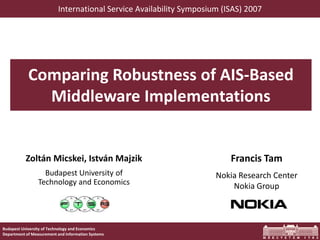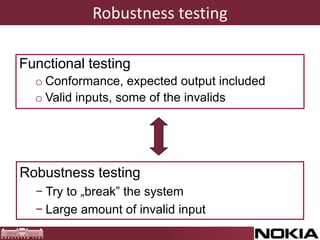Comparing robustness of AIS-based middleware implementations
- 1. Budapest University of Technology and Economics Department of Measurement and Information Systems Comparing Robustness of AIS-Based Middleware Implementations Zolt├Īn Micskei, Istv├Īn Majzik Budapest University of Technology and Economics Francis Tam Nokia Research Center Nokia Group International Service Availability Symposium (ISAS) 2007
- 2. Motivation Comparison: mostly performance. However: Application Component 1 Component N SAF AIS invalid input A faulty application could crash even the HA middleware!
- 3. Robustness ’é¦ ŌĆ×The degree to which a system operates correctly in the presence of oexceptional inputs or ostressful environmental conditions.ŌĆØ [IEEE Std 610.12.1990]
- 4. Robustness testing Functional testing o Conformance, expected output included o Valid inputs, some of the invalids Robustness testing ŌłÆ Try to ŌĆ×breakŌĆØ the system ŌłÆ Large amount of invalid input
- 5. Goal ’é¦ Test and compare robustness of HA MW o Based on common interface ’é¦ Several fault type and mode ŌåÆ automatic test generation
- 6. Fault model: Primary sources Custom Application AIS implementation Operating System Hardware API calls OS calls
- 7. Fault model: Secondary sources Custom Application AIS implementation Operating System Hardware External Components Human Interface API calls OS calls HW failures Operators
- 8. Our testing tools TBTS-TG (type spec.) Workload MBST-TG (mutation) Operating system Hardware OS call wrapper HA Middleware
- 9. Testing tools TBTS-TG (type spec.) Workload MBST-TG (mutation) Operating system Hardware OS call wrapper HA Middleware
- 10. Type specific testing ’é¦ Goal: test the whole interface saAmfInitialize saAmfPmStart saComponentNameGet Handle invalid Handle closed Handle invalid Handle closed Monitoring started Component not registered Handle invalid Handle closed Component not registered Pointer null
- 11. Type specific testing ’é¦ Goal: test the whole interface saAmfInitialize saAmfPmStart saComponentNameGet SaAmfHandleT SaAmfName Handle invalid Handle closed Name invalid Component not registered
- 12. Type specific testing ’é¦ For each function o Fill a template with the parameters o Invalid and valid values ’é¦ Middleware specific: o state based calls o Complex setup code for type values o Running tests as SA-aware components
- 13. Testing tools TBTS-TG (type spec.) Workload MBST-TG (mutation) Operating system Hardware OS call wrapper HA Middleware
- 14. Mutation-based testing ’é¦ Goal: test complex scenarios using multiple functions ’é¦ How? o Write complex test o Mutate existing code with injecting typical robustness faults ’é¦ Sources to mutate o SAFtest o Functional tests in openais
- 15. Testing tools TBTS-TG (type spec.) Workload MBST-TG (mutation) Operating system Hardware OS call wrapper HA Middleware
- 16. OS call wrapper ’é¦ Goal: test environment conditions ’é¦ Provide workload ’é¦ Intercept system calls and o delay, o change return value. ’é¦ Support in OS: o e.g. strace and LD_PRELOAD in Linux
- 17. Testing results ’é¦ Three middleware o Openais version 0.80.1 and trunk o Fujitsu Siemens SAFE4TRY ’é¦ Test execution environment o Configuration file, restart MW, loggingŌĆ” ’é¦ Results: o Differences in headers o Test program aborts o Middleware crashes
- 18. Type specific openais-0.80.1 openais-trunk SAFE4TRY success 24568 26019 29663 segmentation fault 1100 1468 0 timeout 467 2178 2 SAFE4TRY seems to be more robust to these kind of inputs For 6 functions in openais the middleware itself crashed In openais 0.69 segmentation fault was 8001 out of 13460
- 19. Mutation based Example from the observed failures:
- 20. OS call wrapper openais-0.80.1 openais-trunk SAFE4TRY No failure observed 6 5 5 Application failed 0 2 1 Middleware failed 3 2 3 ’éĪ Observations: ’éĪ All are vulnerable for system call failure ’éĪ Some calls cause failure for all: e.g. socket ’éĪ Some depends on system: e.g. bind
- 21. Future work - Obtaining metrics ’é¦ Large amount of output ’é¦ Number of failed tests for a function ŌåÆ robustness faults in the function ’é¦ Help: o Assigning expected error codes o Data mining tools / decision tree
- 22. Lessons learnt ’é¦ Simple tests can find robustness failures ’é¦ Different methods find different failures ’é¦ There are problems even with the headers ’é¦ Existing applications not up-to-date o LDAP DN format, component name get ’é¦ Middleware differ heavily o How-to start, stop; configuration files ’é¦ For complex scenarios, OS call failures o Detailed workload, complex test setup needed ’é¦ Robustness improving



![Robustness
’é¦ ŌĆ×The degree to which a system operates
correctly in the presence of
oexceptional inputs or
ostressful environmental conditions.ŌĆØ
[IEEE Std 610.12.1990]](https://image.slidesharecdn.com/comparingrobustnessofais-basedmiddlewareimplementations-131004015944-phpapp01/85/Comparing-robustness-of-AIS-based-middleware-implementations-3-320.jpg)


















